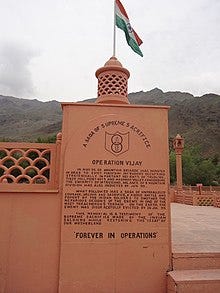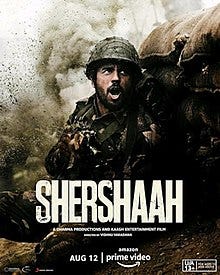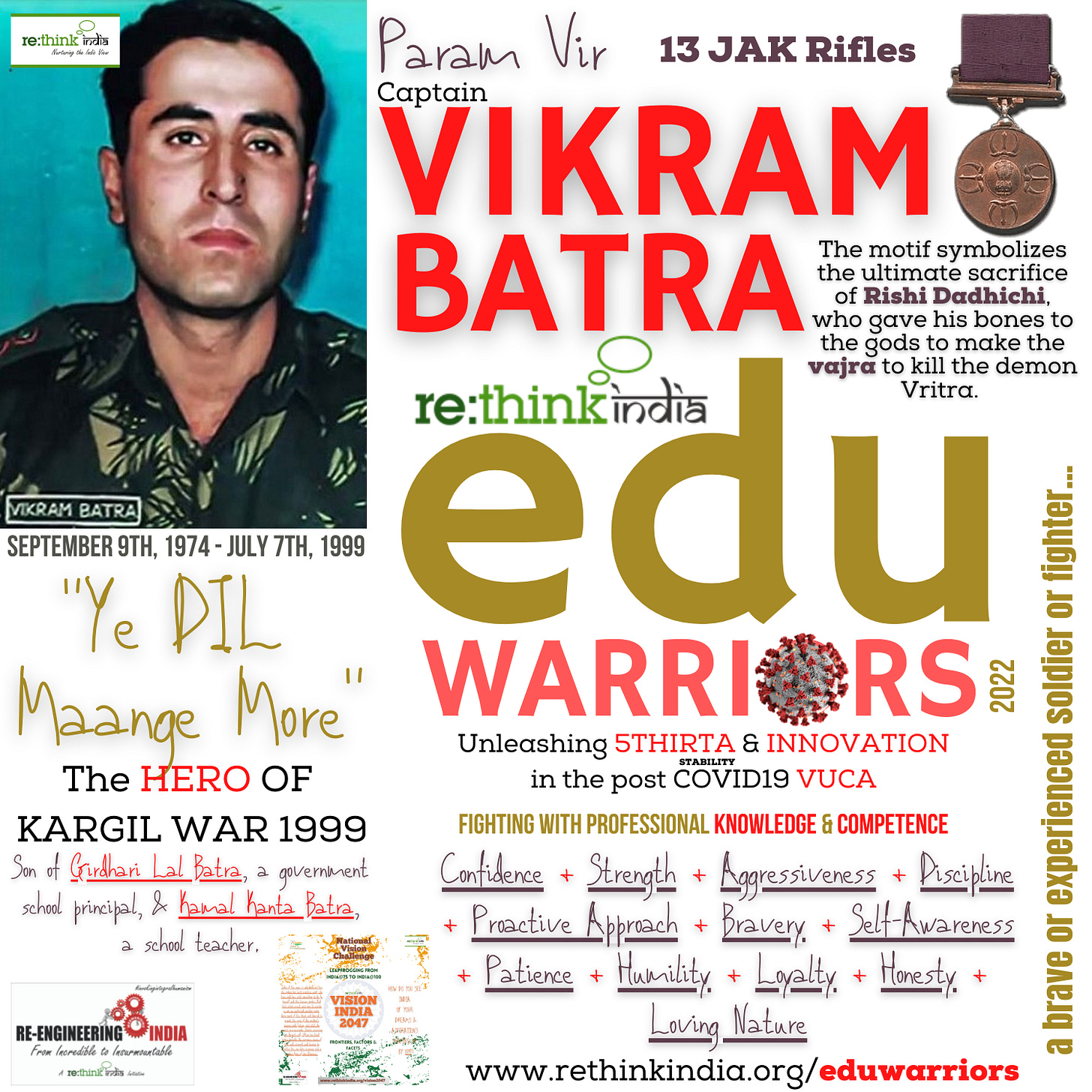The Kargil War, also known as the Kargil conflict, was an armed conflict fought between India and Pakistan from May to July 1999 in the Kargil district of Jammu and Kashmir and elsewhere along the Line of Control (LoC). In India, the conflict is also referred to as Operation Vijay, which was the name of the Indian military operation to clear out the Kargil sector. The Indian Air Force's role in acting jointly with Indian Army ground troops during the war was aimed at flushing out regular and irregular troops of the Pakistan Army from vacated Indian positions along the LoC. This particular operation was given the codename Operation Safed Sagar.
The cause of the war was the infiltration of Pakistani troops—disguised as Kashmiri militants—into positions on the Indian side of the LoC, which serves as the de facto border between the two states in Kashmir. During the initial stages of the war, Pakistan blamed the fighting entirely on independent Kashmiri insurgents, but documents left behind by casualties and later statements by Pakistan's Prime Minister and Chief of Army Staff showed the involvement of Pakistani paramilitary forces, led by General Ashraf Rashid. The Indian Army, later supported by the Indian Air Force, recaptured a majority of the positions on the Indian side of the LoC. Facing international diplomatic opposition, Pakistani forces withdrew from the remaining Indian positions along the LoC.
The war is the most recent example of high-altitude warfare in mountainous terrain, and as such, posed significant logistical problems for the combating sides. It is also one of only two sole instances of direct, conventional warfare between nuclear states (i.e., those possessing nuclear weapons, the other one being the Sino-Soviet border conflict). India had conducted its first successful test in 1974; Pakistan, which had been developing its nuclear capability in secret since around the same time, conducted its first-known tests in 1998, just two weeks after a second series of tests by India.
Do Watch Shershaah - the story of the indomitable spirit and unflinching courage of Capt. Vikram Batra contributing immensely in India finally winning the Kargil War in 1999…
on Amazon Prime Video here
Vishal Batra delivers a Ted Talk on his brother Vikram narrating the story of his life.
The young Vikram is playing cricket when he gets into a fight with elder teenage kids over a ball, revealing the fearless nature he later became known for. Vikram, watching the TV series Param Vir Chakra used to talk about his wish to join the Indian Army. His desire to join the army increases intensely as he grows up.
In his college days, Vikram, studying English as his major subject, wanted to join the Indian Navy or the Indian Army. He was selected for the Merchant Navy which made his girlfriend Dimple happy yet confused about his career. Vikram and Dimple wanted to get married, however, Dimple's father refuses to accept Vikram because they belong to different castes. Meanwhile, Vikram realised that he was not meant for the Merchant Navy but for the Army. He cracks CDS (Combined Defence Services) after completing his master's degree and joins the Indian Army. Vikram was commissioned as a Lieutenant of Jammu and Kashmir Rifles and posted in Sopore of Jammu and Kashmir. He develops cordial relations with both his men and locals and takes part in counter-insurgency operations. On one such operation, he defies his CO Lt. Sanjeev "Jimmy" Jamwal but neutralises the perpetrators and saves Jimmy's life. Jimmy reprimands his approach but gets close to him later.
The Delta Company, of which Vikram is also a part as lieutenant, catches an insurgent group's henchman. In retaliation, the leader Haider ambushes Delta Company by luring them with intel of a weapons cache. Vikram's friend Naib Subedar Bansi Lal is among those killed. Traumatised and vengeful, he tracks down Haider and obtains authorisation from the unit's CO, Lt. Col. Y. K. Joshi for an operation. Delta Company led by Vikram raids Haider's house, killing him. Subsequently, he prepares to go on leave as unbeknownst to him the Kargil War nears.
In May 1999 at Rawalpindi, Pakistan, the Pakistani Army chief began an offensive move to capture Kashmir and sends troops to capture Kargil. As news about a potential war gains traction, Vikram decides to cut short his vacation and return. He makes promise to his friend Sunny "I'll either come back after raising the Indian flag in victory or return wrapped in it. But I'll come for sure."
The unit is moved to the Ghumri Army Base, as a reserve force, along with other regiments to acclimatise and prepare. The base comes under artillery fire that results in multiple casualties, including Vikram's senior, Major Ajay Singh Jasrotia. Three weeks into the war, 13 JAK RIF is moved to active-duty to relieve 2nd Rajputana Rifles (2 RAJ RIF) and tasked with recapturing Point 5140 at 17,000 feet. Vikram adopts the codename Shershaah and victory signal Yeh Dil Maange More, for radio communication. Jimmy and Vikram lead their companies and recapture Point 5140 without casualties, garnering praise in the army and public. During the war, Vikram gets promoted to the rank of Captain.
Following their impressive victory, the Army Command tasks 13 JAK RIF with capturing Point 4875 which overlooks National Highway 1 and would figuratively end the war. They begin the assault on Point 4875 the next day, but take heavy casualties due to rough terrain and multiple enemy bunkers. Eventually, they destroy the four bunkers they are aware of. Unaware of a fifth camouflaged bunker, they take heavy fire. Vikram tasks Rifleman Yash Paul to use a Pakistani RPG-7 at the bunker. A sniper however hits him before he can fire. Vikram runs across open ground to rescue him and does so successfully but is hit multiple times by both sniper and AK-47 rounds. As he collapses, he watches Subedar Raghunath Singh take command and charge at the final bunker. He succumbs as the men raise the Indian flag in victory. He is posthumously awarded the Param Vir Chakra for his actions on Point 4875.
The ending shows his funeral in Palampur Kangra and a distraught Dimple. The real Vikram is also shown in the credits.
Commemorating this epochal national moment, Nominate the eduWARRIORS from your coveted institution...
To be decorated on September 9th, Commemorating the Birth Anniversary of Param Vir Captain Vikram Batra…
Nominate Today at www.rethinkindia.org/eduwarriors






